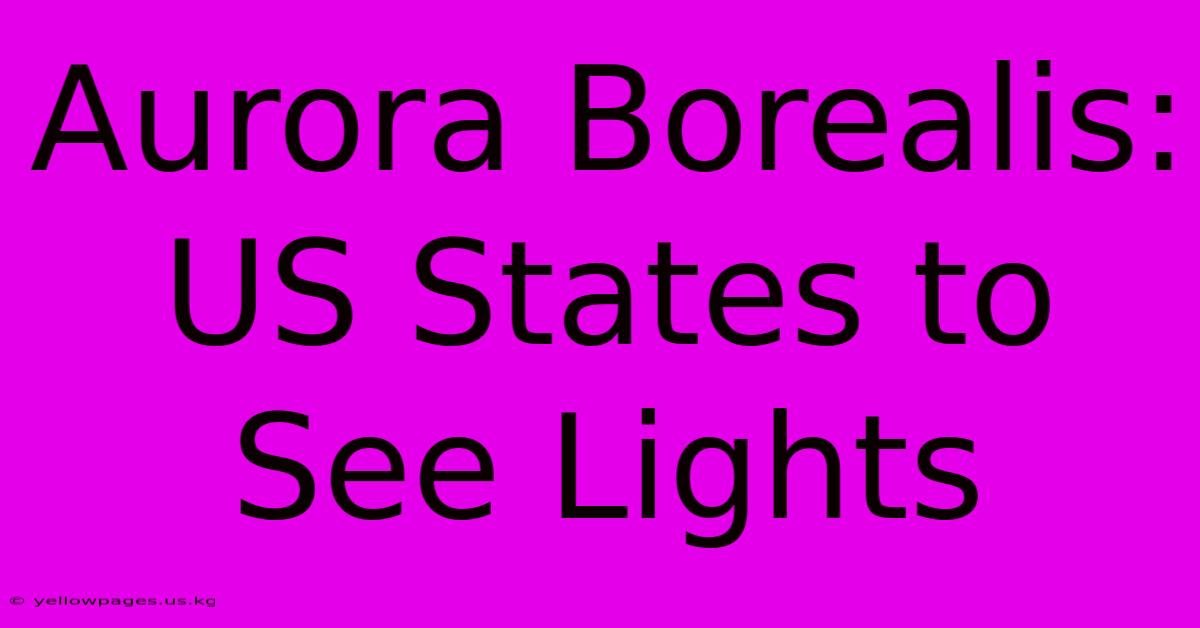Aurora Borealis: US States To See Lights

Discover more detailed and exciting information on our website. Click the link below to start your adventure: Visit Best Website trendingnews.us.kg. Don't miss out!
Table of Contents
Aurora Borealis: US States to See the Lights
The Aurora Borealis, or Northern Lights, is a breathtaking celestial display that captivates onlookers with its shimmering curtains of green, sometimes tinged with purple, red, or blue. Witnessing this natural wonder is a bucket-list item for many, and while Alaska is the most well-known location for aurora viewing in the US, several other states offer opportunities to catch a glimpse of this magical phenomenon. This guide explores the best US states to see the Northern Lights, focusing on optimal viewing locations and times.
Understanding the Aurora
Before we delve into specific locations, it's crucial to understand what influences aurora visibility. The aurora is caused by charged particles from the sun interacting with the Earth's atmosphere. This interaction is strongest near the Earth's magnetic poles, making high-latitude locations the best viewing spots. The intensity of the aurora varies depending on solar activity; stronger solar flares lead to more vibrant displays.
Key Factors Affecting Aurora Visibility:
- Geomagnetic Activity: Check the KP index (a scale of geomagnetic activity). A higher KP index (above 3-4) generally indicates a better chance of seeing the aurora at lower latitudes.
- Light Pollution: Escape city lights! Dark skies are essential for optimal viewing.
- Weather Conditions: Clear skies are a must. Cloud cover will completely obscure the aurora.
- Time of Year: The best time to see the aurora is during the winter months (September to April) when nights are longer and darker.
Best US States to See the Northern Lights
While Alaska reigns supreme, several other states offer a chance, albeit a less frequent one, to witness the magic. Remember, even in these states, seeing the aurora requires a combination of favorable conditions.
1. Alaska: The Aurora Capital
Why Alaska? Alaska's high latitude and vast expanse of dark skies make it the prime location for aurora viewing in the US. From Fairbanks to Anchorage, numerous locations offer incredible viewing opportunities.
Best Viewing Spots: Denali National Park, Fairbanks, Chena Hot Springs.
2. Washington State: A Northern Frontier Experience
Why Washington? While less frequent than in Alaska, Washington's northern areas, particularly near the Canadian border, can sometimes experience aurora activity during periods of high geomagnetic storms.
Best Viewing Spots: North Cascades National Park, the Olympic Peninsula (on exceptionally clear and active nights).
3. Oregon: A Long Shot, But Possible
Why Oregon? Similar to Washington, Oregon's northern reaches offer a slim chance of seeing the aurora during powerful solar events.
Best Viewing Spots: Remote areas of Eastern Oregon, away from light pollution.
4. Montana: A Dark Sky Paradise
Why Montana? Montana’s vast, dark skies offer a better chance than some other lower-latitude states. Combined with potential for high-KP events, Montana occasionally provides aurora sightings.
Best Viewing Spots: Glacier National Park, remote areas of eastern Montana.
5. North Dakota: A Northern Plains Opportunity
Why North Dakota? While rare, North Dakota's northern position and dark skies make it a potential location for aurora viewing during particularly strong auroral activity.
Best Viewing Spots: Theodore Roosevelt National Park (under ideal conditions).
Tips for Aurora Hunting
- Check the Aurora Forecast: Numerous websites and apps provide aurora forecasts, predicting the likelihood and intensity of the aurora.
- Use a Dark Sky App: Find locations with minimal light pollution.
- Pack Warmly: Aurora viewing often involves long, cold nights.
- Be Patient: The aurora is a natural phenomenon, and it can be unpredictable. Be prepared to wait.
- Bring a Camera: Capture the magic! A tripod and long exposure settings are recommended.
Conclusion
Witnessing the Aurora Borealis is an unforgettable experience. While Alaska remains the most reliable location in the US, other northern states provide opportunities for aurora viewing during periods of high geomagnetic activity and clear skies. Remember to plan carefully, check the forecast, and prepare for the possibility of cold, long nights—your patience will be rewarded by the celestial wonder of the Northern Lights.

Thank you for visiting our website wich cover about Aurora Borealis: US States To See Lights. We hope the information provided has been useful to you. Feel free to contact us if you have any questions or need further assistance. See you next time and dont miss to bookmark.
Featured Posts
-
Milroes Role Alabama Vs Michigan Odds
Jan 01, 2025
-
Subway Fire Death Debrina Identified
Jan 01, 2025
-
Puerto Rico Suffers Extensive Power Loss
Jan 01, 2025
-
Klatts 2024 25 Cfp Quarterfinal Picks
Jan 01, 2025
-
Three Star Accolades Msu And Wisconsin
Jan 01, 2025
